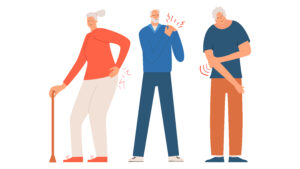
Gout is often known for its sharp pain and swelling, especially in the big toe. But have you ever wondered if it could strike elsewhere in your body?
Understanding Gout:
Gout is a type of arthritis caused by uric acid crystals building up in the joints, leading to sudden and intense bouts of pain, redness, and swelling. While the big toe is the usual suspect, gout can actually target various joints like ankles, knees, wrists, and fingers.
Can Gout Reach Beyond Joints?
Absolutely. While joints are the prime targets, gout can venture into other parts of your body too. Here’s where it might show up:
- Soft Tissues: Uric acid crystals may gather in soft tissues like tendons and bursae, forming tophi—visible nodules under the skin. You might find these in spots like elbows, ears, hands, and feet.
- Kidneys: In chronic cases, gout can contribute to kidney stone formation, causing severe pain. If untreated, it might even damage or fail your kidneys.
- Skin: Gout can cause skin discoloration or tophi around affected joints, especially in areas prone to friction like elbows or knees.
- Eyes: Though rare, gout could affect your eyes, leading to redness, pain, and swelling. Seek medical attention if you notice these symptoms.
Early recognition helps you seek proper care and prevent future complications. If you experience sudden pain, swelling, or redness—whether in your joints or elsewhere—don’t hesitate to reach out to your doctor. They’ll provide the right diagnosis and tailor a treatment plan just for you. Remember, getting help early can significantly improve how you feel and your overall well-being.
Knowledge is power when it comes to managing your health effectively. Stay informed, stay proactive, and prioritize your well-being. At Overlake Arthritis and Osteoporosis Center we help people with arthritic joint pains become pain free and people with autoimmune diseases get their immune system back on track. If you are in the greater Seattle area email us at psr@overlakearthritis.com and we will help you on your journey to wellness.
Consult your rheumatologist or healthcare provider for personalized advice and guidance. Together, you can develop a comprehensive plan that suits your specific needs and helps you manage gout effectively. Be well and stay healthy!

